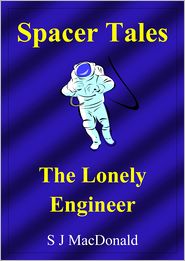Genres: Fantasy, Horror, Science Fiction
Short Story Type: Short Stories
Summary: A collection of short stories celebrating all that is weird in our world, including escaped murderers, haunted fairgrounds, genetic engineering and population control. From a twist-in-the-tale shortie to an adaptation of a episode of a UK horror television series, by means of fantasy, mythology and urban sf/horror, there's something here for everyone.
This is an adult collection – no explicit sex (that I can remember), but some stories contain swearing.
This is an adult collection – no explicit sex (that I can remember), but some stories contain swearing.
Excerpt:
Daughter of Lir
There’s a keen wind off the cliffs tonight. Banshees wail in harmony with the mournful cries of the seagulls that circle above the waves. The tide is in too, a rhythmic pounding on the rocks – the sea’s heartbeat growing stronger as the hour approaches. There is a feeling of anticipation in the darkness; lives have changed, battles been won and kingdoms lost on nights such as this.
Standing on the headland, by the edge of the crumbling chalk with hair stinging his face like a thousand tiny insects, he waits and watches as he’s waited and watched for what may be a hundred lifetimes. If he closes his eyes, faces the wind and looks with an inner vision, he can see forever out there in the ocean.
But it’s not forever he’s looking for. Not tonight with the memories strong and the image of her so clear in his mind it’s as if time itself has looped back for him, giving him another chance to reach out for her, hold on to her and keep her as he’s kept her love in his heart for so long.
Aisling is her name. Daughter of the Gods and forbidden to one of his kind. Aisling, who came to him on a night like this and left him with such a longing that life became meaningless without her. A sea vision, the sailors said – a child of the ocean sent to snare mortal souls with such beauty and song that could charm the angels from heaven itself and make them seem pale shades, ghostly silhouettes against the spell of the children of Lir. Superstition and yet he believes, for he can hear her now, hear the haunting melodies in the wind and the sea.
There is a power in the song, and power still in the singing.
But his Aisling has no need of such weapons. He is already under her spell and willingly. They have pledged their love for one another and though he knew her time was short, he has her promise to hold onto. And when her father called her home, she swore to return one day, to love him as only a child of the Gods can love.
So each year he waits on the headland and listens to the voices of the sea, secure in an unearthly love for a woman who is not mortal. Each year he listens for the song and hears only the banshees’ cries, premonitions of a death for which he can only dream until he finds her again. For the love of a God carries the price of eternity and he knows he will never find peace without Aisling.
The wind stills to silence. The tide ebbs. There is magic in the air tonight.




